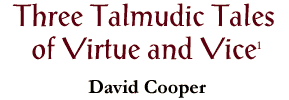First
A betrothed couple were kidnapped by heathens
who married them to each other.
On their wedding night said she to him, “don’t
touch me:
you haven’t given me a ketubah”;
and from that day to the day he died he didn’t.
At his funeral she told the assembled,
“mourn this man who, even more than
Joseph,
controlled his desires. Joseph
never shared his bed with his temptress, but this
man did;
Joseph wasn’t married to
her, but this man was.”
Second
40 bushels of grain were being sold for a dinar,
but one of them went missing.
An investigation revealed the thief and his son
had deflowered a betrothed virgin on Yom Kippur.
Father and son were caught, tried, and stoned to
death,
and the original price was restored.
Third
A guy whose ketubah stipulated a huge cash
settlement
wanted to divorce his wife without paying up.
So he got all his men-servants drunk, put them in
her bed,
smeared egg white all over them, called witnesses,
and brought his case to court. But one of the
judges,
Baba ben Buta of the school of Shamai, said Shamai
taught:
when broiled, egg white contracts but semen
becomes faint.
The evidence tested as predicted and the court
ordered
the fellow be flogged and pay his wife in full.
Epilogue
One rabbi asked another, “I can see why the second and third were punished,
but why did the virtuous one have to suffer so?”
“Because he didn’t
mourn for Jerusalem, as is written:
Rejoice with Jerusalem and be glad for her, all
who love her,
rejoice for joy with all that mourn her.”
______________
©1999, David Cooper.
